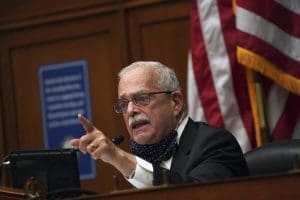Lawmakers say Biden must address protections for whistleblowers
Experts note that a backlog of cases and an unstaffed board are disastrous for whistleblowers and wrongfully fired federal employees.

Democratic Rep. Gerry Connolly of Virginia and Republican Rep. Jody Hice of Georgia, the chair and ranking member of the House Oversight and Reform Committee’s Subcommittee on Government Operations, sent a letter to President Joe Biden Tuesday urging him to protect whistleblowers and other wrongfully terminated federal employees.
They called for Biden to fill empty positions on the Merit Systems Protection Board, an independent agency within the executive branch that monitors the functioning of the federal merit system of hiring and promotion within the civil service. The board determines the outcomes in cases of alleged wrongful termination.
Decisions by administrative law judges on whether appellants were wrongfully terminated cannot be implemented without review by the board.
Connolly and Hice wrote to Biden, “Without a quorum, the MSPB is unable to act on claims of whistleblower retaliation and is at risk of essentially having to cease its operations”:
Since January 7, 2017, the Board has lacked a quorum to perform its responsibilities. Since March 1, 2019, the Board has been without a single board member. Because of these vacancies, the MSPB is unable to issue decisions on petitions for review from federal employees who allege that their agencies have unlawfully acted against them. These vacancies have led to a backlog of more than 3,000 petitions from federal employees requesting review of their allegations.
The three-member board lost its quorum in 2017, soon after Donald Trump entered office, and its last member’s term expired in early 2019.
The board’s own data confirms that 3,071 petitions currently await review.
Experts note that this backlog is disastrous not only for whistleblowers and wrongfully fired employees, most of whom are filing for back pay they have not received for years, but also for federal agencies, which will likely have to shell out tens of millions of dollars all at once when the positions on the board are finally filled.
Bill Wiley, a former MSPB counsel and a federal employment attorney, told the Federal News Network:
Not having a board hurts both sides. [For] the appellants who were fired who should not have been, many of them are sitting out there without a paycheck, so they’re suffering. Agency backpay is accumulating every day that [members] don’t issue a decision, if they’re going to get backpay. It’s one of the rare things that you can screw up in government that really hurts both sides of the equation.
Wiley noted that roughly 10% of the backlogged petitions involve employee back pay. When considering a median two-year wait time for petitions and an average employee salary of $100,000, he estimated that federal agencies will owe some $60 million to terminated employees. Some senior executives with pending cases actually have salaries as high as $200,000.
The Trump administration had a lengthy track record of disdain for whistleblowers and Trump himself had a penchant for wrongfully terminating his own officials.
Under Trump, the Department of Veterans Affairs declared September “Insider Threat Awareness Month,” effectively labeling federal employees who blew the whistle on unethical behavior enemies of the state. An internal email encouraged employees to spy on one another to make sure their colleagues didn’t betray the department.
Last spring, Trump fired five inspectors general of government agencies in six weeks. Each firing occurred after the official made inquiries into or reports of misconduct by members of the Trump administration. Among these was Michael Atkinson, the intelligence community inspector general.
In 2019, Atkinson oversaw the whistleblower complaint filed about Trump’s involvement in pressuring the government of Ukraine to announce an investigation into his likely Democratic opponent in the 2020 election, Joe Biden, and Biden’s son Hunter, which ultimately led to Trump’s first impeachment in the House of Representatives that December.
Trump also fired Gordon Sondland, the U.S. ambassador to the European Union, and Lt. Col. Alexander Vindman, a member of the National Security Council, after they testified against him during his first impeachment trial, as well as Rick Bright, a government scientist who pushed back against the administration’s efforts to distribute and promote the antimalarial drug hydroxychloroquine as a COVID-19 treatment.
On Veterans Day in 2019, Trump tweeted his regret over signing a specific piece of legislation: “To think I signed the Whistleblower Protection Act!”
Published with permission of The American Independent Foundation.
Recommended

President Biden visits Prince William park to talk solar, youth involvement on Earth Day
Virginia set to receive $156 million from U.S. Environmental Protection Agency program
By Charlie Paullin, Virginia Mercury - April 23, 2024
Texas governor and attorney general do little to curb state’s chemical plant crisis
Republicans Greg Abbott and Ken Paxton have taken thousands of dollars in donations from chemical companies and their affiliated PACs.
By Jesse Valentine - December 08, 2023
‘We’ve been waiting for this’: Union workers cheer Biden’s hydrogen hub plan
Federal funding for the hub is estimated to bring over 20,000 jobs to the Pennsylvania-New Jersey-Delaware area.
By Anna Gustafson - October 17, 2023








































































